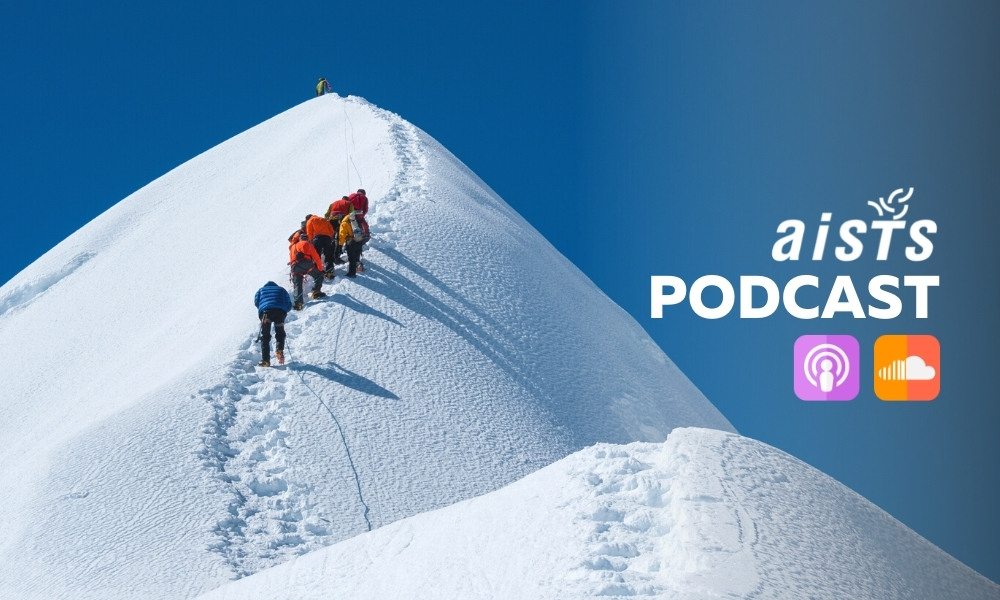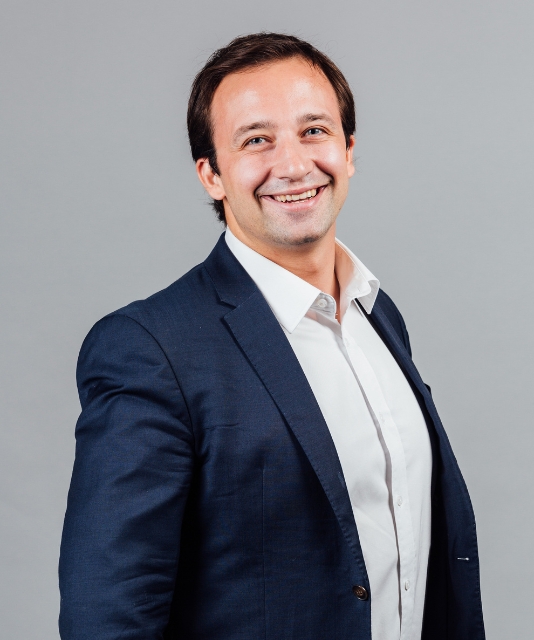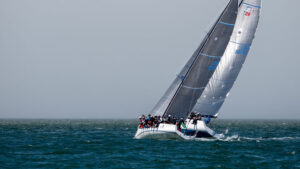
AISTS MEDICINE PODCAST #66
High Altitude Sport and its effects on the body – What happens to people when they climb Mt Everest?
This episode talks about what happens to individuals when they climb Mount Everest. This AISTS Sport Medicine podcast is created by AISTS Class of 202 Carolina Gillespie and Robert Sheppard speak about how the body copes with the climb and instructions to overcome Altitude Mountain Sickness.
The AISTS Sport Medicine podcast is supervised by Professor Boris Gojavonic, MD.

Carolina Gillespie (CG)
For the purpose of this podcast, Carolina is a medical student fascinated by altitude and as she is worried about being healthy enough to go to the top of Mount Everest she is working with some individuals who are doing the climb, such as Robert, and analysing the effect of the climb on their bodies.

Robert Sheppard (RS)
For the purpose of this podcast, Robert is a sports fanatic that has always dreamt of going to the summit of Mount Everest. He has been training for 2 years now he has accepted to participate in the call at the summit and analysis of his body conditions.
Introductory Jingle Plays (3 seconds)
CG: Hello everyone and welcome to the AISTS MED Podcast. This episode will be on what happens to individuals when they climb Mount Everest. I’m Carolina Gillespie, a medical student, doing a project on high altitude and Robert has volunteered to report to me how he felt when at the summit of Mount Everest at 8848m. Robert is with us today after successfully completing his climb and we will hear our short summit recording as well as have his first live feedback after the mission. Robert, thank you for being here with us today. First of all, how are you?
RS: Tired, and very sore! But absolutely thrilled to have been able to conquer Mt Everest for the first time!
CG: Let’s start from the beginning, so when I first called you, you had already trained and were ready to take on the top of the world and so what were your initial thoughts when I told you about this?
RS: I was excited but a bit scared I wouldn’t get a word out when we spoke on the summit! I knew the climb would take a toll on my body but thanks to my training I knew I should be able to get through it, and so it was really interesting for me to find out what was going on in my body – so what interested you in doing this study?
CG: I wanted to examine how your body coped with the climb, as for the listeners who don’t know, anyone who goes over 8000m in altitude is in the death zone, where the amount of oxygen is insufficient to sustain human life for an extended time span. Anyway, let’s listen to what came out of it then and give our listeners a sense of what it really is like up there.
RS: Sounds Good.
RECORDING STARTS – SOUNDS OF WIND AND WALKING ON SNOW FAINT IN BACKGROUND
RS’s Voice to be puffy and slow
CG: Robert, can you hear me?
RS: Loud [puff] and clear!
CG: Congratulations on making it to the summit of Everest! What a huge accomplishment. Let’s quickly look at how you are feeling?
RS: Tired [puff] and a bit out of breath [puff] but all good!
CG: Are you suffering from headaches?
RS: Small headaches [puff] but nothing serious [puff]
CG: Are you suffering from shortness of breath?
RS: No [puff] used extra oxygen the whole way [puff and cough]
CG: I hear a cough, have you had that for a while?
RS: It’s been a few days [puff and cough]
CG: What’s your heartrate like?
RS: Let’s see [puff] staying [puff] between 140-150bpm [puff], pretty stable.
CG: Thanks so much for the call – let’s speak again when you get back down. Stay safe on the way down.
RS: [puff] okay, speak soon
CUT TO IN PERSON MEETING AGAIN
CG: So, hello again Robert, so how was it to be up there?
RS: Absolutely thrilling! You should have seen the view from up here! Unlike anything I’ve ever even dreamed of. I did have a bit of a headache for the last bit of the climb though, which I know is a symptom of Altitude Mountain Sickness even if it was quite mild.
CG: Sounds like it was an amazing experience. It seems you didn’t experience High Altitude Cerebral Edema with impaired coordination and confusion as you seemed as lucid as I’d expect you to be but the headaches could’ve been a worry.
RS: That is reassuring, but could you explain what my body went through to get up there?
CG: Of course, as you increased in altitude, the percentage of oxygen in the air stayed the same (at 21%) however the particles were further apart, therefore even if there was the same percentage of oxygen you felt that there was less oxygen. So up there, if you took off your oxygen mask and took a breath it would’ve felt like you had 28% of oxygen at sea level. This was the main reason you had to acclimatise before attempting the climb. Overall, less oxygen went to your blood which meant less oxygen to your brain and other organs. Now that you can take a breath, tell me how your breathing felt when you were up there?
RS: My breathing was fine, really, as thankfully, I used extra oxygen on the climb, which really helped but the persistent cough that I had for the last few days did get me a bit worried.
CG: You have to be careful with that, a persistent cough, along with laboured breathing when you’re walking, is a sign that your lungs may have been swelling due to constriction of your blood vessels which can cause fluid to leak and accumulate.
RS: Ah, really? So, is this what they call HAPE?
CG: Yes, it’s called High Altitude Pulmonary Edema and it can give you symptoms like a bluish colouration of your skin, really quick breathing and fever, so for anyone wanting to climb the mountain – think twice and be careful about staying at the top for too long.
RS: Definitely something worth noting but there is one thing I actually wanted to ask you. I wore a heart monitor for the entire climb and it consistently showed my heart rate around 140 – 150 bpm throughout, I know heart rates are more elevated when climbing up that high – but could you tell me if this range was normal?
CG: That’s a normal range! To explain to our listeners a little bit, to supply your organs and muscles with enough oxygen to maintain functioning, your heart must work harder at high altitude. This results in an increased heart rate and explains why it may feel like your heart is pounding out of your chest, even at rest.
RS: I’m glad you’re making it this easy to understand because to be honest, I actually don’t remember much of our call because I think my brain wasn’t all there when I was at the top.
CG: That’s totally normal – your body gives you a sense of well-being at the top, which is not natural for how inhospitable Everest actually is.
Well, after hearing all that I’m sure our listeners have a lot of questions and I can sure tell you that I wouldn’t want to go through what you went through! So, my last question is, why did you do it and would you do it again?
RS: It was by any extent of the imagination, the hardest thing I’ve ever done, but it was a dream since I was a child and so now, I feel accomplished. I wouldn’t do Everest again because of how hard it was on my body, but it’s something I’ll always remember and be very proud of.
CG: Thank you Robert, I hope it was interesting to all the listeners and talk to you next time!
You can find more AISTS Sport Medicine podcasts on our Soundcloud channel or on the Apple Podcast app. To learn more about the AISTS Master of Advanced Studies in Sport Administration and Technology, visit https://aists.org/education/master-in-sport-management/
Recent articles





